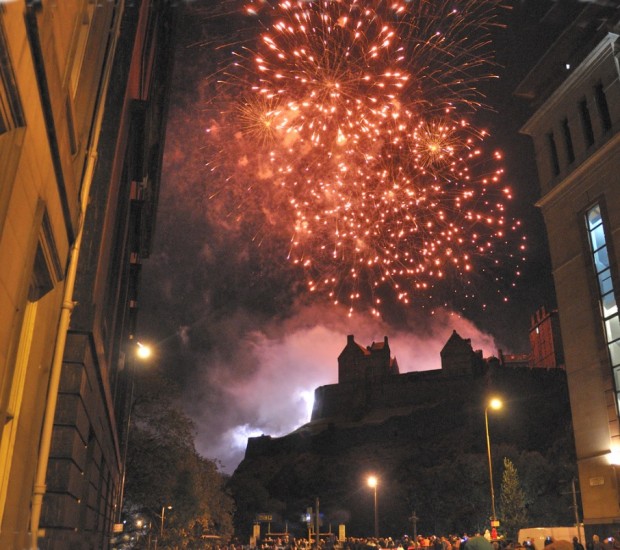You have no items in your cart. Want to get some nice things?
Go shopping
2014 is a big year for Scotland. The referendum that will decide the country’s future is but a few weeks away and the Commonwealth Games are currently being held in Glasgow. Fifty-three nations make up the Commonwealth, and the Edinburgh Fringe has participants from forty-seven of the world’s countries taking part this year. The Fringe has long been the world’s biggest arts festival and yet it just keeps on getting bigger: there are 3,193 shows playing this year, a rise of eleven per cent on 2013.
Comedy continues to be the biggest category, making up a third of the Fringe programme. Big stars always feature – Jimmy Carr, Jack Dee, Mark Watson and Ruby Wax to name but a few – but I always think it’s far more exciting to search out new talent, or to see the show that enables a comedian who’s been on the circuit for many years finally make it into the big time. That was the case for Bridget Christie, the winner of last year’s Edinburgh Comedy Award for her show about feminism. This year she’s back with a new show, An Ungrateful Woman, which promises to be one of the hot tickets of the Fringe.
Female comedians have featured prominently in the news this year as they still face a great deal of sexism on the circuit, from the audience, from promoters and from venues organising line-ups. It is therefore heartening to see that, despite this, the number of female comedians in Edinburgh has risen by over 60 per cent. Aside from Christie, comedian Rosie Wilby also tackles feminism in her latest show, Nineties Woman, in which she traces the participants of a student feminist collective from York University to the present. Other funny women you should make every effort to see include Fringe favourite Zoe Lyons, whom you might recognise from regular appearances on The Wright Stuff and Mock the Week; Jen Brister, one of those hardworking comedians I mentioned above and whom every year I hope will break into the big leagues as she is one of the best mimics out there; and Sara Pascoe, who’s new show, Sara Pascoe vs History, looks at how we deal with the past, and which she performs at the Fringe before embarking on her first ever national tour. Some of the above are taking part in the Free Fringe, where audience members are required only to make a donation at the end of the show.
If you’re more interested in theatre than comedy, then you’re also in luck, for the Edinburgh Festival is one of the best places in the world for new writing. Edinburgh also offers many opportunities for collaboration between performers, artists, writers, directors and companies from all over the world; it can be a potent mixture. Some of the new plays that have caught my eye include The Carousel, a one-woman show from former Fringe Award-winner and Quebec dramatist Jennifer Tremblay and starring the brilliant Maureen Beattie, and Claustrophobia, the debut play from acclaimed novelist Jason Hewitt, about one woman and one man trapped in a lift. I’m also intrigued by God Is My Typewriter, another one-woman show that blends verse, letters and therapy session tapes in an exploration of the brilliant, tumultuous life of the Pulitzer Prize-winning American poet, Anne Sexton. There are also some strong offerings from Ireland, including actor David O’Connor’s first play, Jim, in which two sons prepare to say goodbye to their dying father. Lippy, the UK premiere of an award-winning new Irish play, is the story of four women who decided to die in a starvation pact that lasted forty days. Finally, Fringe First Award-winner Owen McCafferty is back with a new play, Unfaithful, in which he explores relationships, desire and regret.
Although it only makes up the smallest of the programme’s sections (though since it’s only had its own section since 2012 this is hardly surprising), the spoken word category is perhaps one of the most exciting, and interestingly up eighty per cent on last year. Sophia Blackwell is one of the most exciting spoken word artists in the UK at the moment, and is bringing a new show to the Fringe, in which she examines what it really means to have it all, and asks why so many of us are prepared to settle for less. John Berkavitch brings his latest work, Shame, to the Fringe. A blend of spoken word and “hip-hop theatre” involving break-dancers it promises to be a bold and daring exploration of shame, bad choices and wasted chances.
Poet Tim Clare is appearing at the festival again this year, and will be performing award-winning verse about fear and dolphins, among other things. Also not-to-be-missed is Chef, the latest work by talented young writer and performer Sabrina Mahfouz – a strong friend of Litro. Hers is the story of one woman’s descent from haute cuisine head chef to convicted inmate running a prison kitchen, and, of course, Dame Diana Rigg, who will be performing excerpts from her book No Turn Unstoned, in which she examined some of the worst theatrical reviews in history, and how actors survive them. The last is particularly apt for a Festival that is notoriously hard work for all its performers, for whom survival – perhaps even more so than reviews – might just be the biggest marker of success. Oh, and whether they can bear to return next year and do it all over again.

About Laura Macdougall
Laura Macdougall works as a fiction editor by day. At night she can usually be found at the theatre, a gig or a comedy show. She is particularly interested in new writing and work by emerging female artists.




